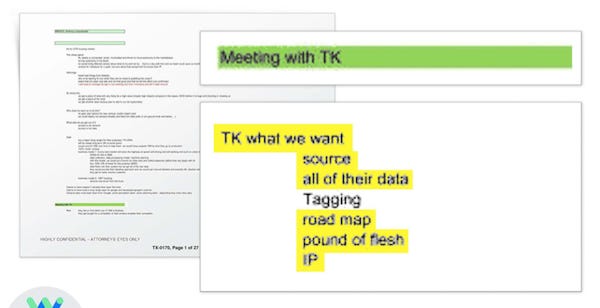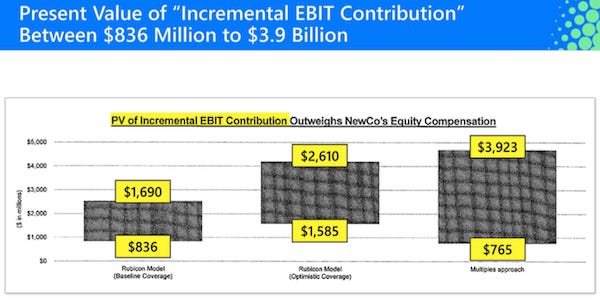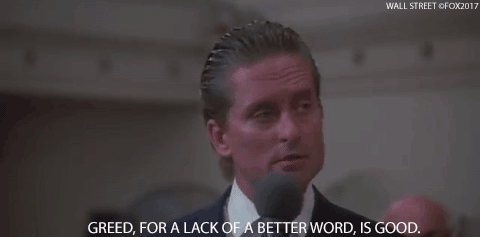Hello and welcome to Oversharing, a newsletter about the proverbial sharing economy.
If you're returning from last week, thanks! If you're new, nice to have you! (Over)share the love and tell your friends to sign up here. This is issue ninety-two, a SPECIAL EDITION for the Uber-Waymo trial in San Francisco, published February 6, 2018.
* * *
Hello! In case you didn't read the note above (and I wouldn't blame you), this is a SPECIAL EDITION of Oversharing to chronicle the Uber-Waymo trial happening this week in US district court in San Francisco. Please also note that there will probably be more SPECIAL EDITIONS of Oversharing this week, depending on how exciting the trial is, and how much spare time I have.
* * *
Shakespeare's Shylock famously demanded a "pound of flesh" as payment from the merchant Antonio, words that later proved his undoing. So, apparently, did Uber's Travis Kalanick. On Feb. 5, the first day of the Uber-Waymo trial, Waymo presented a series of internal Uber memos, texts, and emails that cast the company and co-founder Travis Kalanick as ruthless, win-at-all-costs operators. Here are notes taken by John Bares, former director of Uber's driverless car center in Pittsburgh, on a December 2015 meeting with Kalanick:

There it is! A pound of flesh! These are things that Kalanick (abbreviated in the notes as "TK") wants to get from buying a yet-to-be-named company, "Newco." Here are more of Bares' notes, this time from a meeting in January 2016:

“Newco,” in this case, is Otto, the driverless trucking startup that almost no one had heard of when Uber paid $680 million for it in August 2016. Otto was started by Anthony Levandowski, a former star engineer at Waymo, Google’s maker of self-driving cars. The deal landed Uber in a lot of trouble last year when Waymo sued Uber, alleging it had wooed Levandowski and purchased his barely established company for the thinly veiled purpose of stealing Waymo’s trade secrets.
Waymo is trying to prove not only that Levandowski stole its intellectual property (he allegedly downloaded more than 14,000 files from Waymo servers) but that he took that information to Uber, which unfairly incorporated Waymo’s hard-earned design secrets into its own technology. Uber must prove that it didn’t do any of this, and that if Levandowski acted badly, it was on his own, and not in collusion with anyone at Uber.
But back to the emails, which Waymo showed in court on Feb. 5. Uber would prefer not to focus on these messages, which it considers a flashy sideshow to dry-if-important technical details about whether Waymo’s trade secrets are in fact secrets and, if so, whether they were incorporated into Uber technology. Legal merits aside, however, there are certainly things we can learn from the messages Kalanick and his team exchanged over the Otto deal—namely, not to detail your shady thoughts and plans in texts, notes, and emails.
Here, for example, is a text Levandowski sent to Kalanick in February 2016, two weeks after he unexpectedly quit Waymo and formed Otto: “I just see this as a race and we need to win, second place is first looser [sic].” Levandowski followed this with: “We do need to think through the strategy to take all the shortcuts we can find.”
Here are more phrases attributed in notes to Kalanick:
“This is all about winning”
“To win we have to cross the finish line first, losing is not an option”
And notes from Bares on a Kalanick “redirect” of “top priorities” in April 2016, at which point Uber was discussing a potential Otto acquisition at a price of around $590 million using the code name “Project Zing”:
“Cheat codes. Find them. Use them.”
“the golden time is over. It is war time”
“going slower is NOT an option anymore”
“In each area what we do we need to do to win”
“Reality that matters is catching up. This is the only reality that matters.”
Project Zing, incidentally, was estimated by Uber to be worth hundreds of millions of dollars a year in revenue acceleration. Here is a chart of that in EBIT (earnings before interest and taxes):

Overnight, Uber filed two motions seeking to prevent the jury from seeing some key exhibits on its Otto acquisition, plus testimony by venture capitalist and Uber board member Bill Gurley. The irony was that, in filing these motions, Uber also had to make the stuff public (it had previously been under seal). The upshot is that we now know what Gurley said in his deposition, including that he believed Kalanick committed fraud by failing to disclose underlying facts in the Otto acquisition.
Kalanick is likely to take the stand today, which might explain why the hallway was packed at 6:45am, more than an hour before the courtroom actually opened. Meanwhile, Waymo spent at least 15 minutes this morning arguing for the right to play a clip of Michael Douglas's "Greed Is Good" speech in court. It would like to do this because of a text Levandowski sent to Kalanick in March 2016, when Uber was contemplating its acquisition of Otto. The text read, "Here's the speech you need to give wink wink" (punctuation approximate), with a link to that Michael Douglas speech. I am not sure what the actual link was, but for refresher purposes, this one should do.

Thanks again for subscribing to Oversharing! If you, in the spirit of the sharing economy, would like to share this newsletter with a friend, you can suggest they sign up here. Follow me on Twitter for more from the trial.



